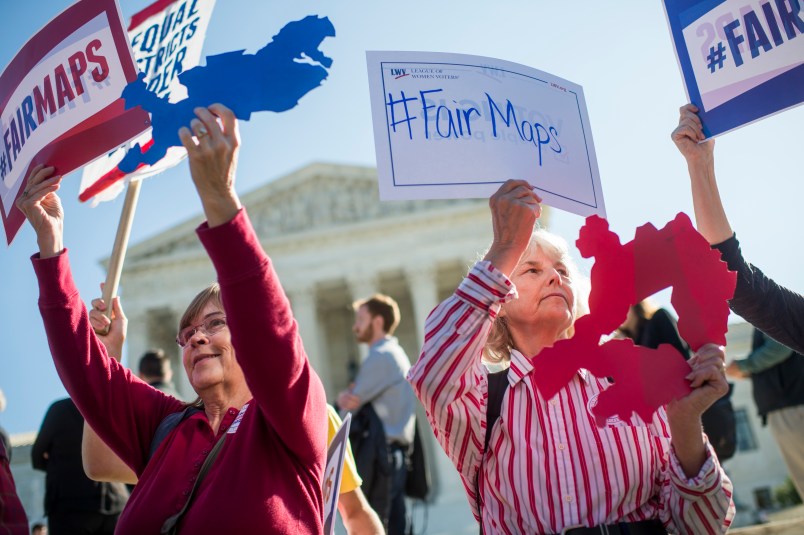The Supreme Court may have decided that federal courts have no say in policing extreme partisan gerrymanders, but the fight for fair maps is far from over.
In a Thursday afternoon press call after the 5-4 ruling from Chief Justice John Roberts came down, the lawyers and voting rights groups that brought the cases before the court acknowledged that they’d been dealt a serious blow. Upholding a GOP-gerrymandered map in North Carolina and a Democrat-gerrymandered one in Maryland was a “green light” and “rubber stamp” for partisan operatives to draw congressional and state legislative maps that benefit their party, they said.
Still, a menu of options remains available to address the wrongs caused by extreme partisan gerrymandering.
Michael Kimberly, the attorney who has spent the past five years fighting to overturn the Maryland map, called the states “the new front moving forward.”
Roberts was wrong to say that there was no judicial standard that federal courts could use to determine an unfair map, Kimberly said, noting that district courts in multiple states had agreed that such standards exist and that judges rely on similar tools and legal analysis to make determinations in other types of cases. Luckily, he continued, other remedies exist.
Common Cause redistricting director Kathay Feng laid those out, saying any of them would provide “some kind of check” on the process.
In many states, voters can push for ballot initiatives that allow for the creation of independent redistricting commissions that take some or all of the map-drawing powers away from lawmakers. State legislatures can pass laws promoting greater transparency and independence in the redistricting process, like Ohio did in 2018. Congress can take action, approving the sweeping voting rights package known as HR1 that would mandate the creation of independent commissions in all 50 states. (The bill already passed the House but has no chance of clearing the GOP-controlled Senate).
In the short term, the likeliest path for reform will come from state courts. A case is currently pending in North Carolina that argues that the same maps the Supreme Court just upheld are an unfair partisan gerrymander that violates the state constitution’s guarantees of equal protection, freedom of speech, and free elections.
Common Cause v. Lewis is set to go to trial in mid-July. That’s the case in which the newly-discovered files of deceased GOP redistricting guru Thomas Hofeller have surfaced, providing rock-solid evidence that North Carolina Republicans crafted maps with what Feng called “partisan and racial animus” in mind.
If the state supreme court determines that the maps violate the North Carolina constitution, they may have to be redrawn before the 2020 elections. Such a ruling would be considered settled law, not something that the North Carolina GOP could then appeal to the Supreme Court, according to Allison Riggs, an attorney with the Southern Coalition for Social Justice.
Riggs represented the plaintiffs in one of the gerrymandering cases the Supreme Court ruled on Thursday, Rucho v. League of Women Voters. She invoked Pennsylvania as an example of how the state court could play out.
In 2018, the Pennsylvania Supreme Court ruled that lawmakers’ congressional maps were an unfair partisan gerrymander. Lawmakers were unable to agree on new districts by a court-ordered deadline, so the court ordered an impartial expert to draw them. Republicans in the legislature tried to appeal their case to the U.S. Supreme Court, but were rebuffed.
In the wake of Thursday’s decisive victory for advocates of partisan gerrymandering, GOP groups agreed that the states were the next real battleground. The National Republican Redistricting Trust called Robert’s decision “a great victory for our Constitution,” and pledged to advance its efforts to retain control of statehouses.
In the lead-up to the 2020 elections, new weight will be placed on governor’s races, state legislative races, and state supreme court races.
Riggs said that the ruling would likely galvanize voters on both sides of the aisle to head to the polls en masse.
“Our democracy depends on us picking ourselves up, brushing ourselves off, and fighting again,” she said.
“We will not take this as the end,” she added. “The battle continues”







The inmates have taken over the asylum, with their crayons and maps…
All the more important to vote for the Dem candidates all across the Federal, state and local 2020 ballots, regardless of whether they meet any unicorn purity test, so we can finally take the Crayola’s away from the children.
Yes, “The battle continues”. We need to focus on getting rid of McConnell and taking over the Senate, along with all our efforts to turn purple states blue. I also said to friends yesterday that right now we have to praise the FSM for giving us the bunch of incompetents and cheats that we are fighting against.
IMHO, any state that is controlled by Dems should pass redistricting plans in December that puts all GOP incumbents in the same district – and creates a one year residency requirement to run for congress from that district.
No collusion!!! No collusion!!!